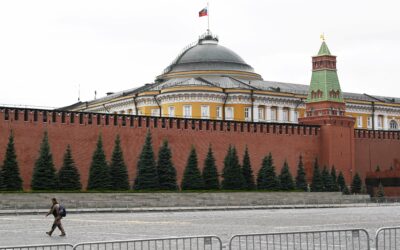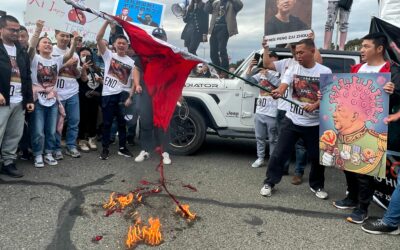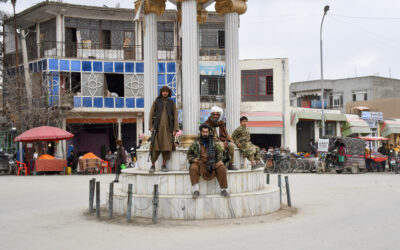
Russia’s Response to U.S. Aid: Shrugs, Disinformation and Warnings of Nuclear War
SUBSCRIBER+ EXCLUSIVE REPORTING — Russia’s reaction to the new infusion of U.S. aid for Ukraine has ranged from shrugs to fury, from warnings of nuclear […] More
Behind the uplifting scenes of Ukrainian resistance, there are some troubling questions as Putin’s war of aggression continues to get increasingly brutal.
(Ed Note: A UK-version of this piece by Cipher Brief Expert Tim Willasey-Wilsey was first published by The Scotsman)
EXPERT PERSPECTIVE — Ukraine has been a revelation. Its blue and yellow flag can be seen everywhere, flying in shopping centres and at sporting events. Its president is a modern-day hero, its army has shown remarkable courage and the refugees, extraordinary dignity.
In an age where nothing seems clear-cut, it is wonderful to have a hero and an even clearer villain. Putin is the new Hitler, an obsessive maniac with no respect for human life. The Ukrainians, by contrast, remind us of our parents and grandparents and their fortitude during World War II.
But of course, nothing is ever quite so simple. At this stage in the war, what is the balance of the good, the bad and the ugly?
The Good
Ukraine’s military performance. Some military analysts expected Ukraine to put up a good fight, but nobody thought they could actually defeat the Russian army, as they have north of Kyiv. The deft combination of conventional and irregular forces owes something to Western training since 2014, and the campaign provides many lessons for our own future military thinking.
NATO unity. It was only in 2019, that French President Emmanuel Macron described NATO as “brain-dead” and former US President Donald Trump was constantly undermining its cohesion. But against most expectations, NATO and the wider Western alliance, seems more unified than at any time since the Cold War. A new-found German robustness has been the biggest revelation and it seems likely that Sweden and Finland will join the alliance before too long.
Western weapons. These have transformed the battlefield. The US Stinger and British Starstreak anti-aircraft missiles have made Russian pilots reticent about entering Ukraine’s airspace. The Javelin anti-tank missile has been supplemented by the Anglo-Swedish NLAW. And the drones, including the now-famous Turkish Bayraktar TB-2, have devastated Russian armoured and logistics columns.
Russian incompetence. To our surprise, the Putin regime has been shown to be dysfunctional. The public humiliation on TV of the head of the foreign intelligence agency (SVR) provided an early clue that his top military and intelligence chiefs live in fear of their leader; and doubtless tell him only what he wants to hear.
Tough sanctions. These have been harsher and more extensive than Putin would have expected. Above all, the freezing of Russia’s foreign exchange reserves (which Putin had deliberately amassed for such an eventuality) has severely restricted his options.
The Baltic States. Latvia, Lithuania and Estonia are now safer because of Putin’s invasion of Ukraine. Russia has weakened itself both militarily and economically for a decade or more. And NATO has bolstered its presence in all three countries.
The Bad.
Resilience. Russia has a tradition of putting its army and population through appalling hardships for long periods. Putin still expects to win in Eastern Ukraine and possibly in the south, too.
Indecision. It was Western indecision and ineptitude which landed Ukraine in this mess. A combination of stating (at Bucharest in 2008) that Ukraine will join NATO, and then not delivering membership, left the Ukrainians in the worst of all worlds; vulnerable to Putin and with no Article Five guarantee of support.
Assurances not honoured. The United States and Britain reneged on the spirit of their assurances (in the deeply-flawed Budapest Memorandum of 1994) to protect Ukraine’s sovereignty. And President Joe Biden won NATO unity at the start of the campaign only by refusing to intervene militarily. This may have been a good decision to prevent a wider war, but it placed Ukraine at Putin’s mercy.
Subscriber+Members have a higher level of access to Cipher Brief Expert Perspectives on Global Issues. Access expert Norm Roule’s analysis of Putting Europe’s Energy Problem into Perspective by Upgrading to Subscriber+ Status now.
Gaps in global support. Whilst rightly applauding the 141 countries which voted in the United Nations against Putin’s invasion, it is a matter of concern that several important nations are still unwilling to support the Western approach. China, India, Russia and Pakistan together comprise 40% of the global population. Saudi Arabia and UAE are still important for the global energy mix but have been alienated in recent years, partly because of the West’s continuing courtship of Iran.
Energy dependency. The way in which Europe allowed itself to become dependent on Russian oil and gas, in spite of the glaring warning of the 2014 annexation of Crimea, is little short of scandalous. Russian gas continues to flow enabling Putin to sustain the war.
Economic stress. Coming so soon after the Covid pandemic, this war could lead to a decade of economic hardship. Big increases in commodity prices; particularly for energy and wheat, could spark political instability worldwide and lead to more populist leaders, more bad policy and more wars.
The Ugly
The problem of Putin. What Biden said in Warsaw was unwise but true. Any peace treaty with Putin still in power will just be a pause while he regroups before trying again. And which powers can credibly guarantee Ukrainian independence having failed in 2014 and again in 2022?
War crimes. There is nothing more dangerous than a conscript army which is frightened and waging a war it does not comprehend. It appears that on occasion, Russian officers have been shot by their own men and discipline may have broken down. The addition of Chechens, Syrians and the Wagner Group will hardly help. It will also be hard to control the Ukrainian response to the appalling scenes they have witnessed.
Weapons of Mass Destruction. For as long as he has these capabilities Putin retains the option of using them. He could use chlorine gas in a Ukrainian city. Even the use of one battlefield nuclear weapon over Ukraine would produce a massive global shock; a trauma that would rekindle our worst nightmares from Cold War days of global extinction.
The good, the bad and the ugly are all worth keeping an eye on, as this war approaches its third month.
The Cipher Brief hosts expert-level briefings on national security issues for Subscriber+Members that help provide context around today’s national security issues and what they mean for business. Upgrade your status to Subscriber+ today.
Read more expert-driven national security insights, perspective and analysis in The Cipher Brief because National Security is Everyone’s Business
Related Articles

SUBSCRIBER+ EXCLUSIVE REPORTING — Russia’s reaction to the new infusion of U.S. aid for Ukraine has ranged from shrugs to fury, from warnings of nuclear […] More

SUBSCRIBER+ EXCLUSIVE REPORTING — When Chinese President Xi Jinping came to San Francisco last November to meet with President Joe Biden, Chinese pro-democracy activists in […] More

SUBSCRIBER+EXCLUSIVE EXPERT PERSPECTIVE — More than two years after its withdrawal from Afghanistan, the U.S. still does not have a clear way forward in the […] More

SUBSCRIBER+ EXCLUSIVE REPORTING — Ukrainians greeted Saturday’s long-awaited House passage of $60.8 billion in aid with justifiable jubilation. For months, their soldiers, civilians, and political […] More

SUBSCRIBER+ EXCLUSIVE REPORTING — A race for control of space is underway, and just as on earth, the U.S. and China are the top competitors. […] More

SUBSCRIBER+ EXCLUSIVE REPORTING — For nearly a week, the Middle East and much of the world were on a knife’s edge, waiting for a promised […] More
Search